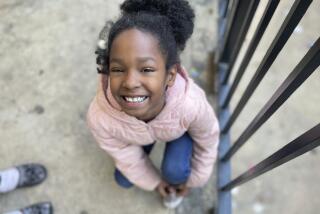One big reason that Syria’s future looks bleak: Education has been a victim of war
As the war in Syria grinds into its seventh year this week, a vital building block of the country’s future has fallen victim to the carnage: the education of its children.
About 1.75 million children and youth in Syria are out of school and most are up to six years behind in their reading and math skills, according to a report published Monday by the International Rescue Committee.
“This is quite alarming,” said Paul Frisoli, the organization’s senior technical adviser for education. “In a country that really promoted the value of education we are now seeing severely low levels of literacy and numeracy, which can have a severe impact on children’s learning going forward.”
The aid group did not have access to baseline findings about learning levels in Syria before the war, but the Arab nation was known to have “a 95%-plus literacy rate,” Frisoli said.
Access to education and learning are not only problems for children inside Syria, according to advocacy groups. Human Rights Watch reported in September that more than half of the 1.5 million school-age children from Syria taking refuge in Turkey, Jordan and Lebanon were not enrolled in formal education the previous school year.
Without an education, the children are likely to be exploited, get caught in poverty, fall victim to extremist ideologies, and will become a “lost generation,” the Karam Foundation, a Chicago-based nonprofit that invests in Syrian schools and supports refugee families, said in a report last year.
Before the war, there were more than 22,000 schools operating across the country, according to the U.N.’s 2017 Humanitarian Needs Overview. Today, at least 7,400 schools are closed and those that remain operational generally have, “poor water, sanitation and hygiene conditions,” IRC officials said.
Monday’s report, conducted in November and based on a survey of about 3,000 children at five schools in northern Syria, shows that almost half of the 13-year-olds surveyed could not complete a math task designed for 7-year-olds, according to the report. And roughly one-third of eighth graders could not properly read a 60-word story intended for second-graders.
The decline in learning is due to several factors, including interrupted schooling due to bomb threats, violence, insecure access to schools, and disruption of the home environment and family structure, child advocacy officials said.
“We know from neuroscience that children who do experience prolonged toxic stress in their lives, that does hamper their brain development,” Frisoli said. “We think there has been learning reversal in some cases. Kids are so stressed because of the environment they are living in.”
More than a quarter of the 3,500 schoolchildren receiving assistance from the International Rescue Committee have had to flee their homes, and many were traumatized after witnessing the impact of the fighting on family members and the harm and destruction caused by airstrikes, according to the report.
Other significant findings include the fact that there are 5.8 million children between the ages of 5 and 17 who need education assistance, meaning they have trouble getting to school because of danger along the way, are not learning due to poor quality education or a lack of teachers, and are at extreme risk of dropping out, among other factors. Fifty-nine percent of sixth graders could not read a simple 7- to 10-sentence story--the equivalent of second-grade reading skills--while 63% of seventh graders could not solve a second-grade subtraction problem. Some 150,000 teachers have left the education system.
The Rescue Committee’s recommendations for improving learning include studying educational programs that work and determining how best to spend money on schools. The report also calls for putting an emphasis on remedial programs that help reinforce children’s basic skills and close the gap between what they know and what they should know at certain grade levels, and helping children build social and emotional skills.
For more on global development news, see our Global Development Watch page, and follow me @AMSimmons1 on Twitter
ALSO
Syria’s lost generation: Children are main breadwinners in many families
UAE’s minister of happiness insists her job is no laughing matter
Bone by bone, Iraqis unearth a mass grave: ‘We will be out there digging until no one is left’
More to Read
Start your day right
Sign up for Essential California for news, features and recommendations from the L.A. Times and beyond in your inbox six days a week.
You may occasionally receive promotional content from the Los Angeles Times.







